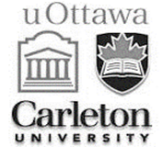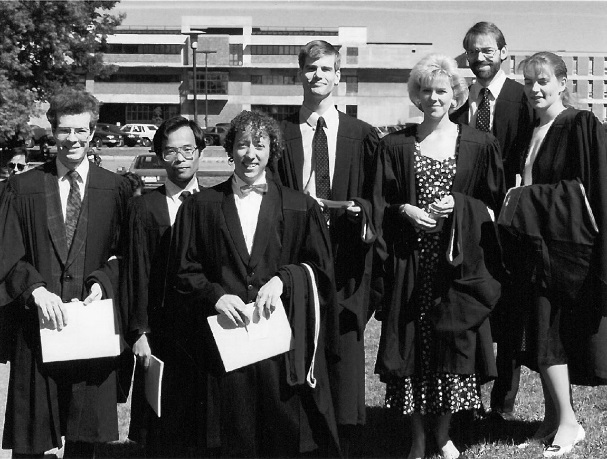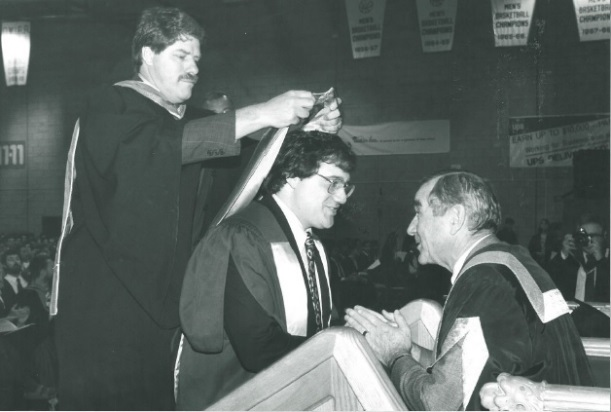Our History
Historical Timeline
Our History
1980 – 2023
The Carleton University School of Computer Science was established in 1980 under the leadership of six cross-appointed faculty members from the departments of Mathematics, Commerce, and Systems Engineering and Administrative Computing. John Neilson served as the School’s inaugural Director.
Initially, the School offered a Bachelor of Computer Science (B.C.S.). The curriculum was designed to give the students a choice of one of five options or streams with a common core. The original options were: Software, Hardware, Theory of Computing, Scientific Applications, Management and Business Systems. These streams equipped students with the theoretical and practical expertise sought by Canada’s rapidly growing software industry. Of the 1500 applications received annually, only 60 students were admitted to the program.
Housed in the Herzberg building – named for Gerhard Herzberg, a former Chancellor of Carleton and Canada’s first Nobel Prize winner for natural sciences – the School initially operated without laboratories, relying instead on the university’s mainframe computer. But as the B.C.S. program gathered momentum and faculty numbers increased, so too did the requirements for upgraded classrooms and equipment.
Within a few short years, the School moved to new quarters in Herzberg. Access to new laboratories with stand-alone 8-bit CP/M based microcomputers, on which the introductory courses were based, positioned the School among the first departments in Canada to fully recognize and embrace the microcomputer revolution.
In 1984, the School introduced a Master of Computer Science (M.C.S.), offered jointly with the University of Ottawa. The following year, a facility was custom-designed in Herzberg with additional space for laboratories, conference rooms, and offices for administrators and graduate students. The Ottawa-Carleton Institute for Computer Science (OCICS) was then formed in 1987 to oversee the joint Master’s and promote collaborative research in computer science among the two universities.
In the mid-80s, the School of Computer Science and its faculty members John Pugh, Wilf Lalonde and Dave Thomas took a leading role among Computer Science programs by introducing Smalltalk, an object-oriented language, into its courses. John Pugh, Wilf Lalonde, and instructor Paul White later went on to create The Object People. With offices in Ottawa, Raleigh in North Carolina, Southampton in England, and Bonn in Germany, the company did worldwide training, consulting, and custom development in Smalltalk and Java. The company was later split up and acquired by BEA and WebGain. Dave Thomas founded Object Technology International (OTI), later acquired by IBM. Together OTI and IBM developed many Smalltalk and Java development tools that ultimately resulted in Eclipse, an open-source tool platform and integrated development environment.
The School achieved another milestone when, in 1988, it added a co-operative education stream to the B.C.S. program, making it the first significant co-op initiative at Carleton. Students in the program benefited from the university’s close proximity to Canada’s high-tech sector by gaining up to 20 months of professional experience at some of North America’s top I.T. companies.
In 1990, a Doctor of Philosophy in Computer Science was introduced and offered jointly with the University of Ottawa. In 2003, the School became the first in Canada to make the Information Systems Professionals of Canada (I.S.P.) designation an integral part of the B.C.S. program. A decade later, the School launched the Institute for Data Science, a major cross-university initiative.
In 2015, the School of Computer Science celebrated 35 years at Carleton University. Over the years, the School has developed a strong national and international reputation for its collaboration with other institutions, partnerships with industry, and research strengths.
We invite you to browse our notable highlights below and read more about the history of Carleton University.
Historical Timeline
| In 1980, the School of Computer Science was established within the Faculty of Science at Carleton University and housed in the Herzberg Building.
|

1980 |

1980 |
Six cross-appointed individuals from Carleton’s departments, Systems Engineering and Computer Science, Mathematics, and School of Business, comprise the School’s founding faculty.
From top left: John Neilson, Frank Fiala, Irwin Reichstein, John Pugh, Wilf Lalonde, Dave Thomas |
| The School offers prospective students an Honours Bachelor of Computer Science (B.C.S.).
|

1980 |

1984 |
The university approves a Master of Computer (M.C.S.) program, offered jointly with the University of Ottawa, in 1984 |
| In 1985, the B.C.S., considered a professional degree, is accredited by the Canadian Information Processing Society (CIPS), the leading Computer Science professional association in Canada. | 
1985 |

1987 |
The Ottawa-Carleton Institute for Computer Science (OCICS) is formed in 1987 to oversee the operation of the joint Master’s program and promote collaborative research.
|
| The School joins a Master of Science in Information and Systems Science (M.Sc.) in 1988, originally established over a decade earlier by the Departments of Systems and Computer Engineering, and Mathematics and Statistics. | 
1988 |
 |
Also, in 1988, Carleton’s first undergraduate co-operative education program is launched by the School, providing computer science students with the opportunity to gain industrial work experience.
Figure: Several of the first co-op students to graduate |
| The School approves a Doctor of Philosophy in Computer Science (Ph.D.) program in 1990, offered jointly with the University of Ottawa.
Figure: Our first Ph.D. student graduates in 1993. |

1990 |

1993 |
In 1993, the School became a founding member of the Consortium for Graduate Education in Software Engineering (ConGESE), a collaboration with universities and industrial partners to offer graduate-level courses to company employees on site. |
| The School develops a certificate program in 1999 which retrains graduates of Science and Engineering in Software Engineering. | 
1999 |

2003 |
In 2003, the School became the first in Canada to make the Information Systems Professionals of Canada (I.S.P.) designation an integral part of its B.C.S. program. |
| In 2011, the School joined with other units at Carleton to create Canada’s first Master’s program in Human-Computer Interaction. | 
2011 |

2015 |
The School establishes the Institute for Data Science in 2015 and offers a Collaborative Master in Data Science.
Figure: Dr. Frank Dehne announces the Institute’s launch |
| In 2016, the School introduced the first undergraduate Computer Science Internship Option in Canada. Through this option, students benefit from a traditional university experience coupled with innovative experiential learning in an industrial environment. | 
2016 |

2020 |
In April 2020, Carleton’s first cohort of the Industrial Applications Internship Option celebrated their graduation with Shopify, Carleton’s first industrial partner in the program. The Internship Option is a first-in-Canada, four-year, work-integrated learning program that combines hands-on development experience with an accredited computer science degree. From the inaugural group, 88% obtain full-time positions at Shopify as Web Developers, User Experience Developers, or Data Scientists. |
| In September 2022, the School of Computer Science welcomed it’s first cohort of master’s and PhD students in the newly created Data Science, Analytics, and Artificial Intelligence (DSAAI) program. A natural extension of the popular Data Science collaborative degree – the DSAAI program offers opportunities to undertake groundbreaking research in the field of data science and analytics in several disciplines such as statistics, artificial intelligence, and software engineering. | 
2022 |

2023 |
The School joined with other units at Carleton to offer a collaborative Master’s in Computer Science with a Specialization in Cybersecurity. |








